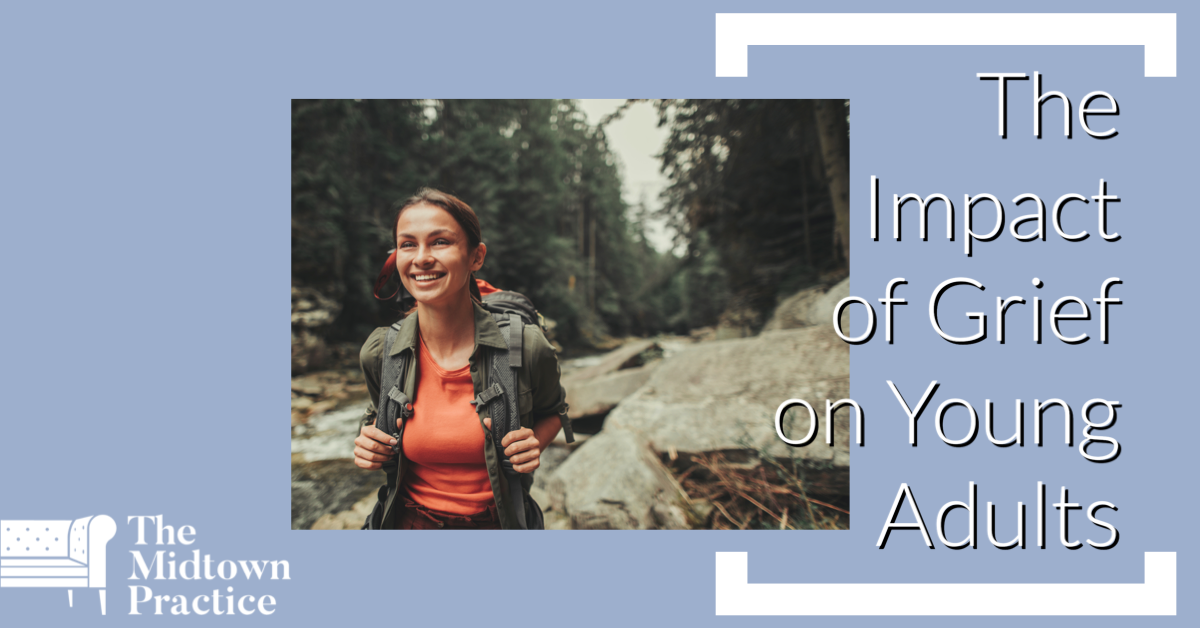Losing a loved one is among the most challenging experiences an individual ever confronts. And when you lose a loved one – especially a parent, sibling, or spouse – as a young adult, those emotions tend to be amplified and intensified.
As a therapist who focuses much of my work on grief and bereavement, I have worked with many young adults as they navigate the mourning process.
How do Young Adults Deal with Trauma and Grief?
Young adulthood is often a time of new beginnings – finishing college, starting a career, perhaps moving to a new city, maybe meeting a life partner and even starting a family. These exciting changes can be simultaneously painful when, for example, a parent is not there to cheer you on at college graduation, dance with you at your wedding, or hold your new baby. A client grieving the loss of her father while planning her wedding said to me, “Who’s going to be there to walk me down the aisle?” Another client once commented how painful it was when she recognized that her partner would never have the opportunity to meet and understand the true essence of her incredible mother.
Sometimes for young adults, the mourning process can be particularly difficult when friends show up to support them immediately following a loss, only to be rapidly consumed by their own busy lives shortly thereafter. Since many cannot relate to the experience of losing someone, they often neglect to check in with the grieving friend. A young woman who lost her brother to suicide once told me, “it feels like everyone else has moved on.”
Is it Possible for Young Adults to Heal After a Loss?
Fortunately, while the grieving process takes time, most individuals can heal after a loss, especially with the proper support in place.
Navigating Grief as a Young Adult: Strategies for Coping and Healing
Here are some things that can be supportive during the mourning process:
- Identify who you want in your inner circle – who do you feel most comfortable talking to about the loved one, sharing memories, crying with, and honoring the loved one? Who will be there for you unconditionally and at any hour of the day?
- Allow yourself to feel whatever emotions come up- Some of the common grief reactions (as identified by psychiatrist Elisabeth Kubler-Ross) include denial, anger, bargaining (i.e., attempting to figure out how to alleviate the pain or what you imagine you could have done differently), depression, and acceptance. This list of emotions is by no means exhaustive, so whatever feelings you are experiencing, don’t avoid them; rather, make space for them and let them be there.
- Practice daily self-care – self-care looks different for every individual but know what small things make you feel good and what provides healthy routines for you. Self-care can include a daily meditation practice, taking walks, chatting with a friend on the phone, drinking a hot cup of tea, taking a bubble bath, journaling, playing with a pet, gardening, getting a massage, or planning an activity or trip to look forward to. And, of course making sure you are maintaining good sleep, eating, and exercise habits is incredibly important. These are often neglected during the mourning process and can exacerbate feelings of grief, sadness, and anxiety.
Grief Support for Young Adults
Please reach out to us at The Midtown Practice for Psychotherapy (TMP) if you are struggling to cope on your own and would like to be connected with a clinician who specializes in grief and bereavement.
We can also connect you to grief support groups, some that are led by professionals and some that are peer-led. Some reputable organizations in New York City include The Center for Loss and Renewal and The Dinner Party. The former is a private practice that specializes in grief counseling, and the latter is a peer community for 20s and 30s grieving a loss.
Accepting Grief
As human beings, we also grieve things that are not deaths – such as the loss of a relationship, job or financial losses, or an injury – and we at TMP are here to support you through these major life changes. Part of grieving involves the acceptance of loss and experiencing the associated feelings. Once we recognize that loss is unavoidable, we learn to feel sadness and even despair while moving forward in life. Loss and sadness do not need to dominate; instead, they can coexist with other emotions while we build our future.
Something important to keep in mind is that Prolonged Grief Disorder (PGD) differs from usual grief in its intensity, pervasiveness, and duration. People with PGD suffer for more than a year with an excessive preoccupation with the loss to the point that their symptoms disrupt their daily functioning. PGD is a newer psychiatric diagnosis that was added to the DSM (Diagnostic and Statistical Manual of Mental Disorders) in recent years as specific psychotherapies have been developed to help clients suffering from PGD. If you are experiencing PGD or other symptoms of grief, we can help. Please call us to discuss the different offerings at our practice and how we can best support you during this difficult time.

Recent Comments